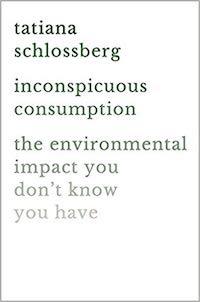When the topic of environmental impact and climate change comes up, we frequently hear about broad concerns such as weather changes, rising sea levels and air quality issues that can sometimes be difficult to wrap our heads around on an individual level. Many of our daily actions, however, do have an impact on the world around us, and those impacts can be pretty surprising.

For example, binge-watching a show on Netflix can affect drinking water on the other side of the country, while washing a load of laundry can release thousands of plastic microfibers into the water system, many of which make their way inside of the bodies of freshwater fish. The maybe-not-so-fresh roses for sale at the grocery store likely made a long, fuel-consuming airplane trip all the way from Columbia, while a sale-item cashmere sweater at the mall has contributed in part to expanding the Mongolian desert.
Discovering the impacts that many of our daily behaviors and purchases have can be depressing and overwhelming, but Tatiana Schlossberg’s “Inconspicuous Consumption: The Environmental Impact You Don’t Know You Have” (2019, Grand Central Publishing) manages to explain these connections in an accessible, informative and, maybe most worth noting, humorous way.
With short sections boasting titles like “Athleisure Forever!” and “Silicon Valley: A Toxic Waste Dump? You Decide,” Schlossberg sheds light on the complexities surrounding how the things we purchase, the foods we eat and the services we interact with make their way to us from all corners of the globe.
“Inconspicuous Consumption” covers a broad range of topics for every interest; Schlossberg aptly notes that “the story of climate change – and all of our stuff – is actually a story about everything: science, health, injustice, inequality, national and international politics, the natural world, business, normal life.”

In an early chapter, Schlossberg shares the details of finding a fiber cable route, or, more simply stated, the internet, “in the wild” while visiting Colorado in 2017. As she describes, “I happened to be cross-country skiing by myself at the time (an activity that my skill level suggests I should not do alone) and I fell.” 2017 being a year with little snow, Schlossberg notes, “the track where I happened to be skiing was a white streak through the desert, not the snowy winter wonderland I had imagined when I was tricked into going skiing.”
Due to the lack of snow coverage, Schlossberg noticed while lying on the ground a US West Communications fiber cable route sign beneath telephone lines. The chapter’s narrative then takes a step back and walks through a brief background of how and where fiber cable routes are laid.
As Schlossberg explains, “this may seem like a long digression that doesn’t seem to have a lot to do with the environment, but believe me when I say I have a point: as much as the internet represents the exchange of ideas and information, it’s also a physical thing, a network that connects us, materially, in cables and routers and blinking lights all over the world.” This physical system requires tangible resources in both energy and land, the needs of which continue to grow as our usage of the Internet increases in duration and in amount.
Schlossberg works to untangle a dense web of the environmental impact created by products and services that are so familiar to us that we rarely give them much consideration – specifically within the categories of technology, food, fashion and fuel. If the thought of discovering the actual impact of our daily interactions within these areas sounds disheartening, fear not – Schlossberg states, encouragingly, “As I went through the five stages of environmental grief – denial, anger, trying to use less plastic, depression, determination – while writing this book, I came to realize in a new and powerful way that, in the end, we’re not powerless.“
Though there are numerous times throughout this book that the question of how to lessen the impact of any given thing can be summed up with “it’s complicated,” Schlossberg makes a compelling point: we should make informed individual choices day-to-day based on our own values, but we are likely most effective collectively by engaging policy makers and companies, and by voting for what matters to us. Most simply put, “Inconspicuous Consumption” ends on the suggestion to “Ask questions. Demand change.”
Hannah Evans is the senior librarian at the Smiley Branch of the Denver Public Library.

Be the first to comment